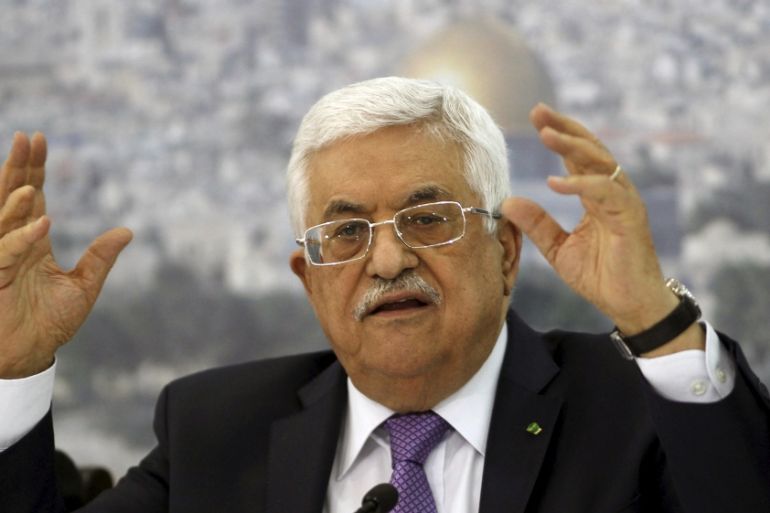Fatah will give Abbas an honourable exit
Fatah’s seventh congress will throw more light on who will be Palestinian President Mahmoud Abbas’ successor.

Defying strong pressure from regional and international players, Palestinian President Mahmoud Abbas is poised to hold the seventh congress in Ramallah of the movement that he, along with Yasser Arafat and other now-aging leaders, launched more than 50 years ago.
Seven years after the sixth Fatah congress was held in Bethlehem in 2009, an improvement on the 20-year delay between the fifth and sixth congress, the new congress will include nearly three quarters of its delegates from inside the occupied territories and a little more than one quarter from the diaspora.
Keep reading
list of 4 itemsPalestinian President Abbas says only US can halt Israel’s attack on Rafah
Palestinian Prisoner’s Day: How many are still in Israeli detention?
Gaza war reminds Vietnam of liberation struggle once shared with Palestine
This, along with the absence of Mohammad Dahlan and his supporters, is perhaps the most prominent feature of the congress due to take place Tuesday. The date for the congress, to be held in Abbas’ Al-Muqataa headquarters, November 29, is the international day for solidarity with the Palestinian people.
|
|
Abu Mazen (Abbas) was under tremendous pressure to reconcile with the renegade Gaza leader Mohamed Dahlan by countries like Egypt and the United Arab Emirates (UAE). But, Abbas stuck to his guns.
After some delay and speculations over the list of delegates, last week invitations to some 1400 people were sent out. Many of the new delegates were chosen over the past two years in local primaries throughout the West Bank and Gaza strip, while others were chosen to represent various unions, institutions, women activists and other membership type organisations that normally have internal elections.
Concerns to be addressed
During the congress, Fatah will need to define its relationship with what has been called recently the Arab quartet: UAE, Saudi Arabia, Egypt and Jordan. Recent reports in Israeli media have suggested that the Arab quartet were pushing for Arafat’s nephew and former PLO representative to the UN, Nasser al-Qudwa to replace Abbas. The suggestion was rejected by Palestinian leaders as Arab meddling in Palestinian affairs and has not resurfaced since.
A successful seventh congress will help stop the haemorrhage that has taken place within the Palestinian leadership and will allow for the ushering in of a new generation of leaders. Abbas has consciously refused to name a successor preferring to see what comes out of the democratic process of the movement.
READ MORE: Killing Arafat – ‘Does Abbas have any evidence?’
After the congress, Abbas will be able to deal more seriously with Hamas in the reconciliation efforts and hopefully will be able to convene the Palestine National Council with the participation of Hamas, thus revitalising the PLO as the leader of the Palestinian liberation struggle.
Politically, it is not clear if the congress will make any major breakthroughs in formulating its manifesto. According to Ziad Khalil Abu Zayyad, the young Fatah spokesperson, the congress will discuss “Palestinian relations with Israel, the role of the youth in the movement, the relation with some Arab countries, the assignment of a deputy for Abu Mazen (Abbas) within Fatah and will evaluate how to empower popular resistance.”
While the term “popular resistance” was approved by the sixth congress, the movement has not done much to flesh out what it means and how to incorporate nonviolence resistance within a national liberation strategy.
Fatah activists have introduced the term “smart popular resistance” possibly alluding to the idea of creating a mass movement that doesn’t use any violence and is able to survive the constant Israeli repression of any kind of Palestinian opposition to its occupation and settlement activities.
The issue of succession
The list of Fatah congress delegates makes it clear that the Abbas has regained total control over Fatah and has succeeded in purging Dahlan and his supporters. The movement might be slightly weaker as a result, but its unity and independence will now enable it to move forward.
|
|
It is not clear, however, how the congress will handle the issue of succession of Abbas. There is a decision to name a deputy to the leader of the movement, but it is unclear at this time whether there is consensus, or even a majority for this move, unless Abbas is willing to spend his political capital on one individual, and he has not shown that willingness until now.
Depending on who among the top Fatah leaders emerges as the strongest, it is possible that a collective leadership will be formed that can eventually take up the three major positions Abbas holds: head of Fatah, president of Palestine and chairman of the PLO’s Executive Committee.
Convening the seventh congress and successfully concluding it will go a long way in sealing Abbas’ singular rule over the movement and will allow him to chart the short-term goals of the movement. But all delegates understand that this will be Abbas’ last congress, and therefore support him to ensure the success of an honourable succession process.
Daoud Kuttab, an award-winning Palestinian journalist, is a former Ferris professor of journalism at Princeton University.
The views expressed in this article are the author’s own and do not necessarily reflect Al Jazeera’s editorial policy.
